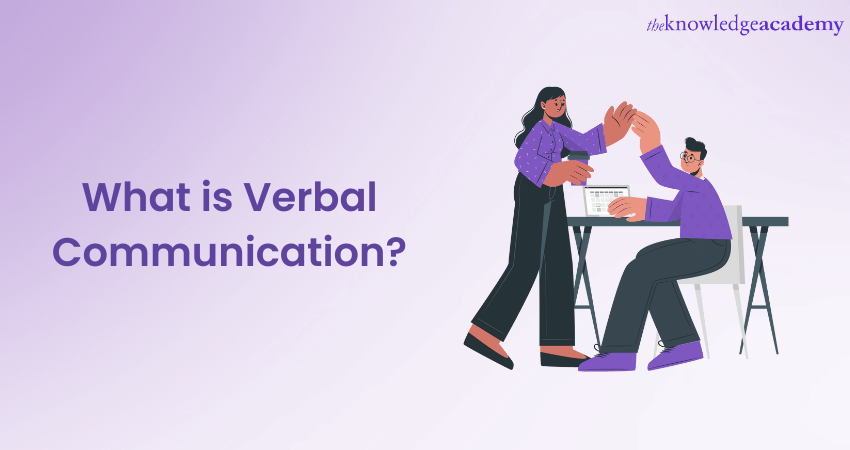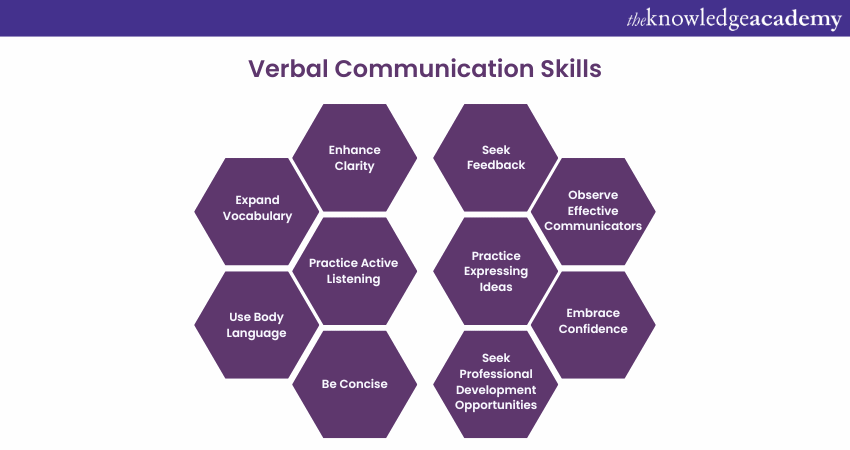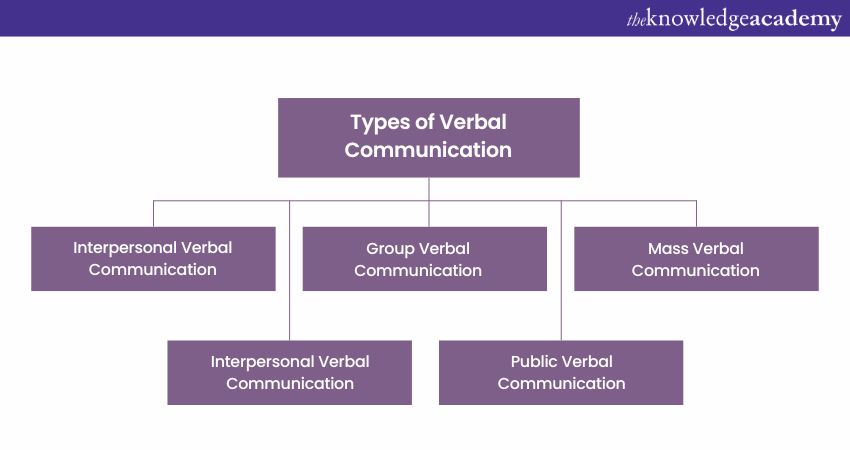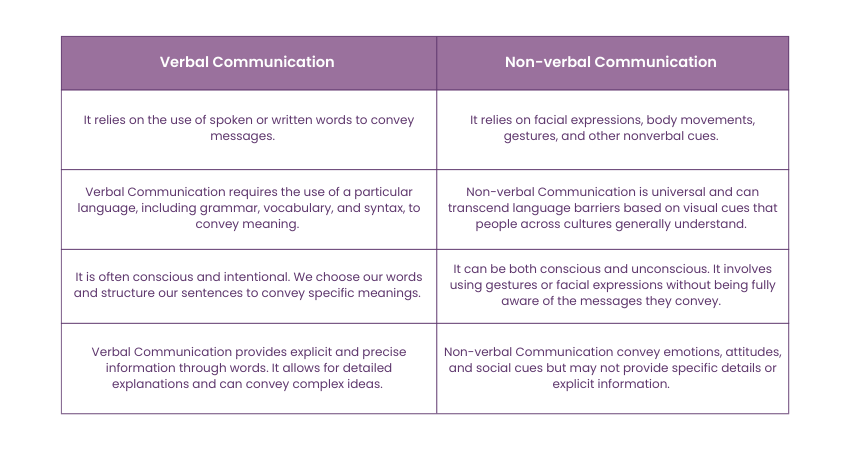We may not have the course you’re looking for. If you enquire or give us a call on +971 8000311193 and speak to our training experts, we may still be able to help with your training requirements.
Training Outcomes Within Your Budget!
We ensure quality, budget-alignment, and timely delivery by our expert instructors.

Consider this scenario: you are leading a team meeting, and despite your best efforts, your message doesn't resonate with your colleagues. Wondering, why is this happening? The answer lies in the nuances of Verbal Communication. But What is Verbal Communication, and how can it be harnessed to ensure clarity and engagement in professional settings?
In this blog, we will explore What is Verbal Communication, it's critical components, and how mastering this skill can elevate your professional interactions. Let’s uncover the secrets to impactful Verbal Communication and learn how to make every word count in the workplace.
Table of Contents
1) What is Verbal Communication?
2) Benefits of Verbal Communication
3) How to Develop Strong Verbal Communication Skills?
4) Four Different Styles of Verbal Communication
5) Types of Verbal Communication
6) What are the Differences Between Verbal and Non-verbal Communication?
7) How to Overcome Challenges in Verbal Communication?
8) The Importance of Verbal Communication in the Workplace
9) Conclusion
What is Verbal Communication?
Verbal Communication is the technique of the usage of spoken phrases to express ideas, mind, and feelings to others. It includes the usage of your voices to speak with humans round us, whether it is via conversations, presentations, or speeches. It permits you to deliver data, share testimonies, ask questions, and connect with others on a deeper stage.
It is critical to your regular interactions, allowing you to explicit yourself, apprehend others, and construct relationships. By improving your Verbal Communication capabilities, you can grow to be more effective Communicators and decorate your potential to convey messages surely and hopefully.
Benefits of Verbal Communication
This section of the blog will expand on the various benefits of Verbal Communication.
1) Clarity and Precision:
Verbal Communication allows people to present their thoughts with readability and precision. They can use phrases, tone, and voice modulation to make certain that their message is known accurately.
2) Immediate Feedback:
One of the key benefits of Verbal Communication is the ability to receive instantaneous remarks. This allows audio system to gauge the listener's know-how and make vital changes to their message in real-time.
3) Non-verbal Cues:
Verbal Communication isn't just about phrases; additionally, it is non-verbal cues along with body language, facial expressions, and gestures. These cues provide extra context and help convey feelings and intentions.
4) Personal Connection:
Speaking directly with someone allows for a personal connection that written Communication often lacks. Tone of voice and emotional expression can help build rapport and trust between individuals.
5) Effective Problem-solving:
Verbal Communication is vital in group discussions and collaborative hassle-solving. It allows team individuals to share thoughts, brainstorm, and attain consensus more effectively.
6) Flexibility:
Verbal Communication may be adapted to match the target market and the situation. Whether it is a proper presentation, an informal verbal exchange, or a Negotiation, individuals can modify their way of communication accordingly.
7) Cultural Understanding:
Verbal Communication lets people from different cultural backgrounds engage in conversation, fostering cross-cultural knowledge and reducing misunderstandings which can arise from written Communication.
8) Immediate Resolution of Issues:
Verbal Communication is essential for addressing conflicts and resolving troubles directly. It lets people talk about concerns, clarify misunderstandings, and discover jointly agreeable solutions.
9) Enhanced Learning:
In educational settings, Verbal Communication is vital for effective teaching and learning. Teachers can explain complicated concepts, solution questions, and engage students in discussions, promoting better comprehension.
10) Emotional Expression:
Verbal Communication gives a platform for expressing feelings, whether it is sharing pleasure, imparting aid, or conveying empathy during difficult times. It strengthens interpersonal relationships.
Don’t let fear hold you back – sign up for our Assertiveness Skills Training and navigate complex conversations!
How to Develop Strong Verbal Communication Skills?
To develop strong Verbal Communication skills, consider the following tips:

a) Practice Active Listening: Concentrate on understanding the speaker's message by paying attention, preserving eye contact, and keeping off interruptions.
b) Enhance Clarity: Speak genuinely, pronounce words well, and use appropriate tone and extent to make sure that your message is understood without difficulty.
c) Expand Vocabulary: Continuously enrich your vocabulary with the aid of studying books, articles and engaging in conversations to explicit yourself extra efficaciously.
d) Use Body Language: Pay attention to your non-verbal cues, such as maintaining good posture, using hand gestures, and displaying open and engaged body language.
e) Be Concise: Express your thoughts clearly and concisely, avoiding unnecessary jargon or complex language.
f) Practice Expressing Ideas: Engage in conversations, debates, or presentations to practice articulating your ideas and thoughts fluently.
g) Seek Feedback: Request feedback from trusted individuals on your Communication skills, allowing you to identify areas of improvement and refine your Verbal Communication abilities.
h) Observe Effective Communicators: Observe and learn from skilled communicators, such as Public Speakers or professionals, to gain insights into effective Verbal Communication techniques.
i) Embrace Confidence: Cultivate confidence in your speaking abilities by practising and visualising successful Communication scenarios.
j) Seek Professional Development Opportunities: Attend workshops, seminars, or courses focusing on enhancing Verbal Communication skills to gain valuable insights and techniques.
Learn all the essential techniques to excel in all aspects of Communication with our comprehensive Communication Skills Training. Join now!
Four Different Styles of Verbal Communication
This section of the blog will outline four different styles of Verbal Communication and expand on them.
Style 1: Aggressive Style of Verbal Communication
An aggressive style of Communication is characterised by the use of forceful and confrontational language. Individuals employing this style often dominate conversations, disregard others' opinions, and may resort to shouting or verbal attacks. This approach can lead to hostility and conflict in Communication, making it less effective for productive dialogue.
Style 2: Passive Style of Verbal Communication
A passive style of Communication involves a reluctance to express one's own opinions or needs. Individuals using this style often avoid confrontation, but this can lead to poor self-advocacy and misunderstandings. While it may prevent immediate conflict, it can result in unmet personal needs and desires.
Style 3: Passive-aggressive Style of Verbal Communication
The passive-aggressive style combines elements of passivity and indirect hostility. In this approach, individuals may use sarcasm, backhanded compliments, or subtle sabotage to express their displeasure or frustration. It often creates confusion and can damage relationships due to hidden resentment, as the true feelings are not openly communicated.
Style 4: Assertive style of Verbal Communication
Assertive Communication involves the clear and respectful expression of one's thoughts, feelings, and needs. It values the rights and opinions of both one’s self and others. An assertive Communicator strives to communicate honestly and directly while also actively listening to others. This style fosters healthy Communication, promotes understanding, and helps resolve conflicts constructively. It is considered one of the most effective forms of Communication for building positive relationships and achieving mutual goals.
Types of Verbal Communication
Verbal communication manifests in several ways. Let's delve into each type in detail:

a) Intrapersonal Verbal Communication: This refers to the conversations we have with ourselves in our minds. It involves self-reflection, self-analysis, and self-expression. This internal dialogue helps us process thoughts, make decisions, and reflect on our experiences. For example, talking to yourself to prepare for a challenging situation can boost confidence and improve performance.
b) Interpersonal Verbal Communication: It occurs between two or more people and plays a crucial role in building relationships, expressing emotions, and exchanging information. It involves Active Listening, clear articulation, and effective response. Using verbal cues, such as words, tone of voice, and non-verbal gestures, helps convey messages accurately and establish meaningful connections.
c) Group Verbal Communication: This involves interactions within a small group of people, such as team meetings or collaborative discussions. It requires effective participation, active listening, and respectful association. Group members share ideas, exchange information, and work together to achieve common goals. Facilitating open dialogue and encouraging equal participation can enhance group dynamics and promote effective collaboration.
d) Public Verbal Communication: This involves speaking to a larger audience, such as giving a presentation, delivering a speech, or leading a public event. It requires clear articulation, engaging storytelling, and effective delivery techniques to captivate and inform the listeners. Public speaking skills can help inspire, persuade, and influence others, making it an essential skill in various professional and social settings.
e) Mass Verbal Communication: This reaches a wide audience through television, radio, or online platforms. It involves broadcasting information, news, or entertainment to the public. It relies on effective message creation, presentation, and delivery to capture and maintain the audience's attention. It influences public opinion, shapes cultural norms, and facilitates the exchange of ideas on a large scale.
Become a speaker who leaves a lasting impression – sign up for our Public Speaking Course now!
What are the Differences Between Verbal and Non-verbal Communication?
Let’s discuss some of the key differences between Verbal and Non-verbal Communication:

How to Overcome Challenges in Verbal Communication?
Improving communication skills involves overcoming challenges in Verbal Communication leads to developing effective strategies for enhanced interaction and understanding. Ways to overcome challenges include:
Positive Reinforcement
Positive reinforcement involves using encouraging words and non-verbal cues to develop rapport and reinforce openness in others. It encourages active participation, shows genuine interest, builds and maintains relationships, provides reassurance, and creates a warm and welcoming environment.
Effective Questioning
Effective questioning is a powerful technique for gathering information and seeking support. Closed-ended questions seek brief responses, while open questions invite elaboration and encourage deeper engagement. Both types of questions serve different purposes in directing conversations and facilitating meaningful dialogue.
Reflection and Clarification
Reflection involves restating the speaker's message in your own words, demonstrating understanding and active listening. It allows for clarification and confirmation, shows respect for the speaker's perspective, and fosters a deeper connection and mutual understanding.
Summarising
Summarising involves providing a concise overview of the main points or key issues discussed. It serves as a way to review and validate the shared understanding between Communicators, ensuring effective Communication and serving as a guide for further action.
Closing Communication
The closing of a conversation is just as important as its opening. Verbal cues, namely expressing gratitude or signalling the need to conclude, are worth noting. Along with non-verbal cues like maintaining eye contact or engaging in appropriate parting gestures, it helps bring conversations to a natural and respectful close.
Master the Art of Effective Communication – Register in Our Business Communication Course Today!
The Importance of Verbal Communication in the Workplace
Open communication in the workplace is a cornerstone of a healthy and productive environment. Here are some key advantages of promoting open communication:
a) Increased job Satisfaction: When a company promotes open communication among its employees, regardless of their rank or seniority, it helps them feel heard and valued.
b) Fewer Conflicts: Workplace conflicts are common, but when a company encourages open communication, misunderstandings are easier to resolve. By expressing ourselves clearly and directly, we ensure our colleagues understand our perspectives.
c) Stronger Relationships: If a company aims to foster a healthy and productive team, practicing open communication is essential. It helps employees connect with each other and builds professional relationships based on trust.
d) Higher Productivity: Miscommunication in the workplace often hampers productivity, causing unnecessary delays. Open communication mitigates this by empowering employees to seek clarification on their tasks, thereby minimising misunderstandings and boosting productivity.
Conclusion
In conclusion, understanding What is Verbal Communication can significantly enhance your interactions and relationships. By refining this skill, you can improve your ability to convey ideas clearly and foster a more collaborative and engaging environment. Effective Verbal Communication can make every conversation an opportunity for connection and growth.
Master the basics of Non-verbal Communication by registering for our Nonverbal Communication Training today!
Frequently Asked Questions

Verbal Communication should be clear, concise, and considerate, using simple language tailored to the audience. Active listening, appropriate tone, and non-verbal cues such as eye contact enhance its effectiveness.

Verbal miscommunication arises from unclear language, cultural differences, poor listening skills, or ambiguous messages. Misinterpreted tone or body language can also lead to misunderstandings, impacting relationships and objectives negatively.

The Knowledge Academy takes global learning to new heights, offering over 30,000 online courses across 490+ locations in 220 countries. This expansive reach ensures accessibility and convenience for learners worldwide.
Alongside our diverse Online Course Catalogue, encompassing 19 major categories, we go the extra mile by providing a plethora of free educational Online Resources like News updates, Blogs, videos, webinars, and interview questions. Tailoring learning experiences further, professionals can maximise value with customisable Course Bundles of TKA.

The Knowledge Academy’s Knowledge Pass, a prepaid voucher, adds another layer of flexibility, allowing course bookings over a 12-month period. Join us on a journey where education knows no bounds.

The Knowledge Academy offers various Communication Skills Trainings, including the Assertiveness Skills Training, Effective Communication Skills Course, and Public Speaking Course. These courses cater to different skill levels, providing comprehensive insights into What is Nonverbal Communication.
Our Business Skills Blogs cover a range of topics related to Effective Communication, offering valuable resources, best practices, and industry insights. Whether you are a beginner or looking to advance your Communication skills, The Knowledge Academy's diverse courses and informative blogs have got you covered.
Upcoming Business Skills Resources Batches & Dates
Date
 Public Speaking Course
Public Speaking Course
Fri 28th Feb 2025
Fri 11th Apr 2025
Fri 27th Jun 2025
Fri 22nd Aug 2025
Fri 24th Oct 2025
Fri 28th Nov 2025







 Top Rated Course
Top Rated Course



 If you wish to make any changes to your course, please
If you wish to make any changes to your course, please


